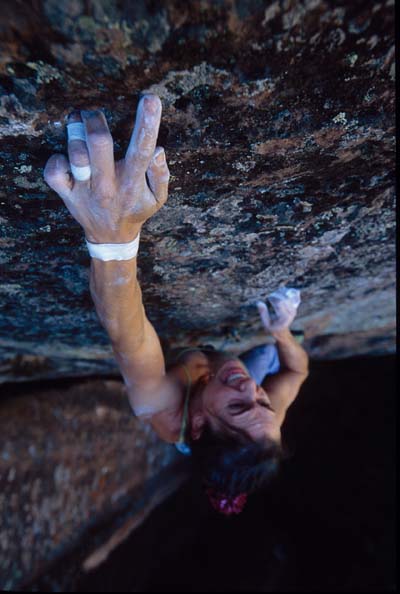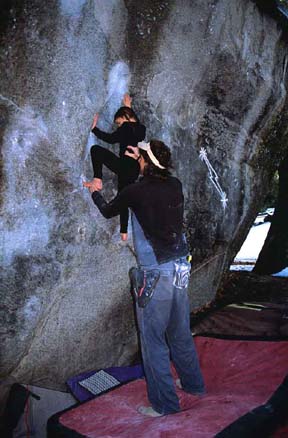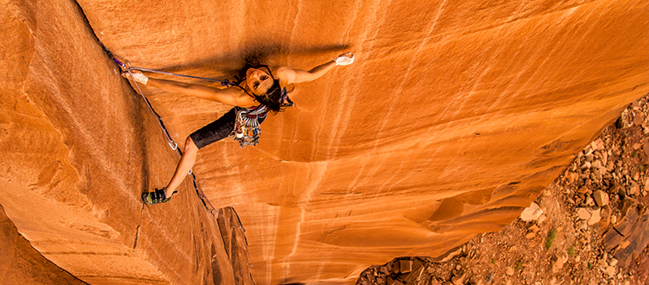Talking About STRESS
- January 2008
- Training Uncategorized

Hi Steph!!! It’s a really great thing your book is being translated to italian and i
think you should be very proud!!
Hey I’m writing you about my question too….Some time ago i read an article written by you for the italian magazine “alp wall” about your free “salathè and free rider”on el capitan….and you said that your approach to climbing has been influenced from the fact you played the piano before university….I’ve got the same approach…I played piano too, for many years, and I’m used to repeat the exercise many times, until it’s perfect…but when i have to “show” my work to the public it put me under too much stress …
that’s the same for climbing..and that’s a problem for me, because i’m into climbing competition too, and sometimes i get bad results because of too much psychological stress…and sometimes i think that my piano-past have a negative influence on it…So i would like to know what do you think about it, and what are the things that influenced your approach to climbing ..and, surely, what techniques you have when you need to relax and concentrate….
Sarah
Dear Sarah,
I was amazed and also laughing a lot when I read your email…..it makes me wonder if classical pianists are all the same! I started playing piano when I was three, with the Suzuki method where they train very young children by rote, without written music. Then you learn to read music after a few years, and every day you practice. Lots of recitals and performances…… I practiced a half hour a day, from the age of three, increasing to an hour a day through my childhood. And although sometimes I hated “having” to practice, I also loved playing music, and learning to play difficult sections of pieces I liked. But just like you, I could barely stand performing. I felt so nervous and tense, and so worried about making mistakes. Even my weekly lessons, where I had to play for my piano teacher, were very fraught for me. I loved sight reading new pieces of music, just going for it, and working my brain and hands as fast as I could as I navigated through an unknown piece of music, feeling it rather than perfecting it on the first try…..just moving naturally through the piece, enjoying this thing I could do. But that was definitely not the “right” way to play! and it was just for my own fun 🙂

I remember the teacher I had in high school, an amazing pianist who had studied at Juilliard. She wouldn’t let me get away with the slightest technical error, ever, and she was very intimidating……when I played my weekly lesson on her grand piano, my shoulders always crept up to my ears as I subconsciously grew more and more stressed out. She would walk up behind me as I played and suddenly push my shoulders down, several inches, startling me every time, because I had no idea I was tensing up like that as I played. Any time I struck a wrong key as I played for her, I would try to not let it faze me and keep playing. She would shriek, “Fix IT!”, stopping me wherever I was in the piece. I would cringe and stop short, go back to the passage and fix it, humiliated. Performances were even more stress-inducing, especially as I had to try not to make the slightest mistake, and then do something different than I had been taught—that is, continue playing, unfazed, if I did err a little. Once that first mistake has been made and perfection has been ruined, it takes enormous willpower and courage to keep on going. Especially when your brain is full of a voice shouting “FIX IT!!” and you’re trying to keep your brain full of the next musical passage….. Ooff, I just gave myself the shudders!
So I guess it’s no surprise that when I started climbing, the only thing I could not stand was redpointing sport routes, and trying to be “perfect” in a rehearsed peformance of a redpoint. I’d try it two or three times, and then tell myself I obviously wasn’t good enough yet if I fell off on the last attempt I made….I didn’t belong on something so hard. Heck, I wasn’t even an athlete, I was a musician! Of course I couldn’t do it! It never occurred to me to wonder why I could often onsight harder than I could redpoint, for the first few years of climbing. Then I finally figured it out……performance anxiety!!
Once I came to terms with the deeper issue going on with me, I realized that my musical background was a huge advantage. If I could let go of my need for absolute perfection, and my distracted feelings of peformance pressure around other people, I had an amazing tool that many people don’t receive at such a young age. I had been taught, since the age of three, to try something I couldn’t do and attempt it over and over and over until finally I could do it, repeatedly. All I had to do was transfer that skill to my climbing, and address the thing that was stopping me from maximizing it. That roadblock was self-confidence. I lacked self-confidence, ironically, thanks to the same thing that gave me my biggest tool.
Since I had been a pianist, student, and reader for my entire life up to that point, I had no experience or confidence with athletics and outdoor sports. So I was pretty sure I would fail in this new arena when I tackled something new. It took me many years of experience, discipline, and success to realize that at a certain point in time the numbers had changed, and now over half my life had been spent as an athlete.
I wish I had realized earlier that discipline, training, and a positive, happy mindset will always lead me to succeed–I think I wouldn’t have felt the stress and uncertainty I felt for many years as a young climber…… I have seen over and over again as a climber that natural talent will only carry a climber so far. I have also seen that discipline and passion will always carry one further. In seventeen years of climbing, I have met many rock climbers who are far more talented than me naturally, but who never take that talent to the next level because they have never had to work hard to be a little bit better than those around them…. The big projects and pushing to the next level require hard work and devotion. As a pianist, you have that. Now you can let go of your anxiety and your need for “perfection.” That has been drilled into you as a pianist, but other things have too.
Keep the good tools you’ve been given—discipline, drive and physical mastery—and let go of the negative ones—anxiety, fear of failure and judgment, thoughts of the outside. I used to think, “Oh, I’m not an athlete, I’m not naturally talented or experienced enough, I’m sure I’ll fail!” Now I think, “I work harder than anyone I know. I know I’ll do it eventually….maybe now, maybe next month, because I always work hard, and I always do it. It doesn’t matter when, so I don’t have to be anxious or stressed…..eventually I know I will do it!” Now I love taking on big, hard free climbing projects, and working my way up to a redpoint of a climb I thought I could never do. That is such a fulfilling, empowering feeling, and it always takes me to a new level in climbing, raising my ability, and increasing my self confidence for the future as well. But I also love the release and passion of onsighting and free soloing. In the end, it is always about relaxation, controlled desire, and self-confidence, and finding your way to get those feelings in pressure moments.
It might not happen overnight, but plant the seeds of those thoughts in your mind, and this is the next place you will go.
And, as always, the simplest physical techniques always work. If I am anxious, or my mind is swirling and I can’t empty my thoughts, I take deep breaths, smile, and repeat calming and reassuring things over and over in my mind: “Be relaxed. Have good feelings.” are the ones I’m using right now. This technique I learned from climbing has helped me so much as I learn to BASE jump, something that involves lots of fear and need for perfection. It works! When someone’s telling you to do something, even if it’s you yourself, you often obey 🙂
Ciao bella!
xxx Steph








[…] Talking About STRESS […]